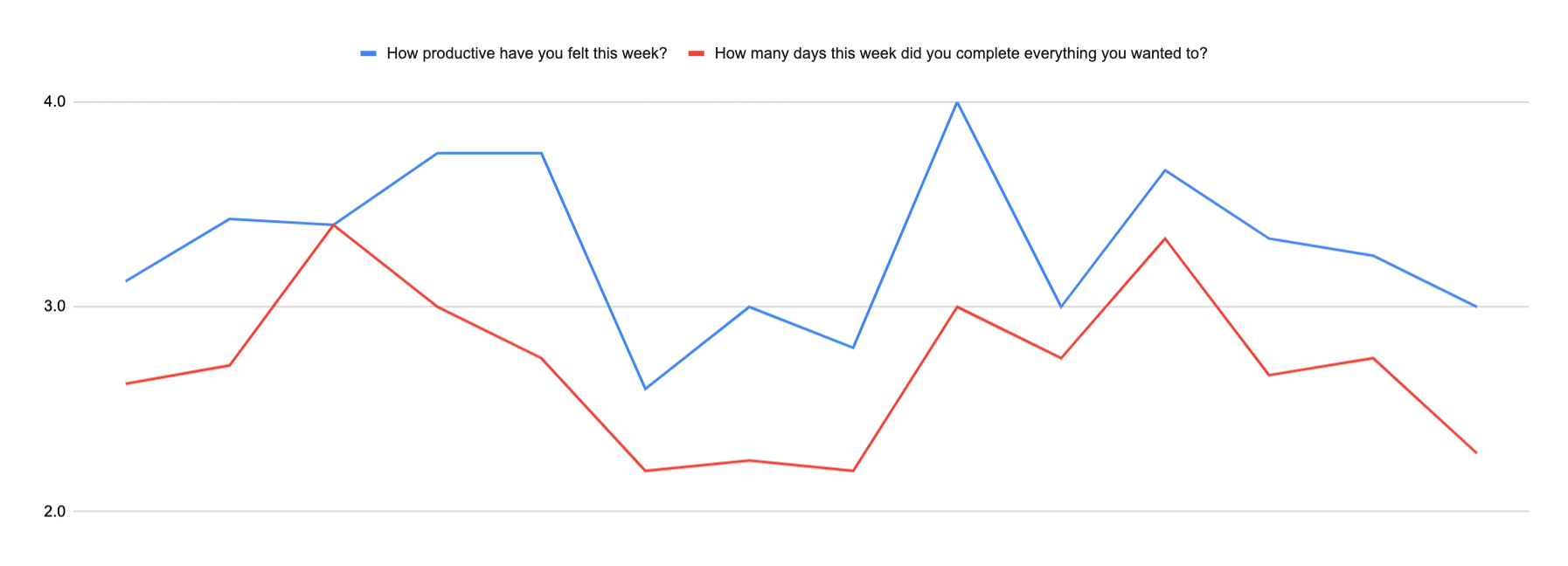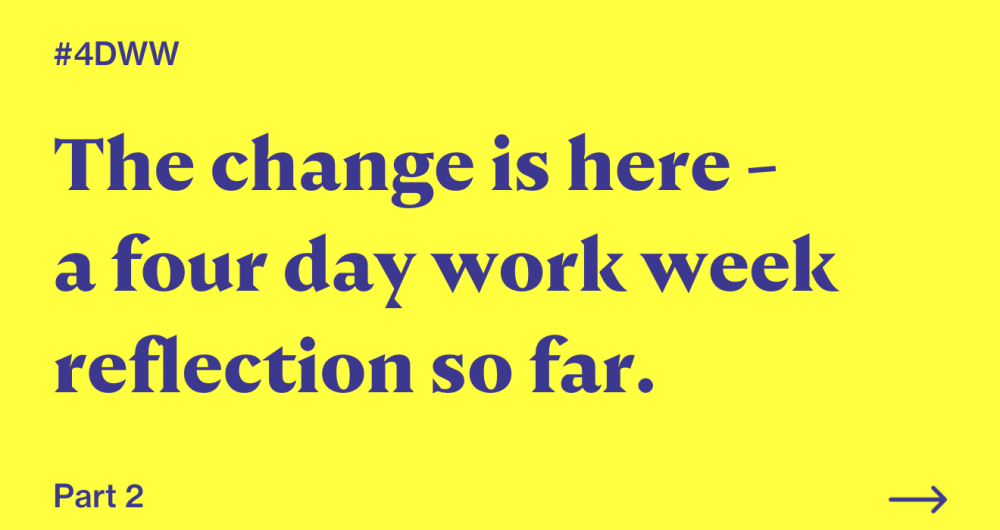We hosted an event on 16th March 2022 with Escape the City, full of inspiring insights, stories, and lots of really practical questions from the audience. We have had such an overwhelming response since the event we are planning a follow up event, with more time for questions from attendees.
The contributors who shared their experiences on 16th March were:
- Dominic Jackman (Escape the City)
- Joe Ryle (4 Day Week Campaign / Autonomy)
- Hetti Dysch (City to Sea)
- Hannah Cox (betternotstop)
Hetti Dysch shared in depth findings from the 4 Day Work Week (4DWW) trials at her place of work, City to Sea.
The highest ranking challenges they experienced were:
- Overstretched
- Work loads not decreased
- Difficulty scheduling meetings
The highest ranking positive impacts they experienced were:
- Happier team
- Sustainable work culture
- Team retention
- Increased diversity in recruitment
Hannah Cox has been championing a 4DWW for many years, she is the Chief Happiness Officer at The Better Business Network, and Founder of Better Not Stop. A powerful voice for doing good in the world. She shared her insights and tips into the practicalities of a 4DWW, how to manage time and productivity, for yourself and your teams.
Dominic Jackson, co-founder of Escape the City, took us back to the start of his journey as a founder of a company that has always strived to do better, pivoting the company to best suit the needs of the employees. The team at Escape the City have shifted in size over the years, and are constantly innovating and adapting, taking risks, and learning.
Joe Ryle is heading up the UK’s 4DWW campaign which is proving to be a huge success. The latest news explains how more than 3,000 workers at 60 companies across Britain will trial a four-day working week, in what is thought to be the biggest pilot scheme to take place anywhere in the world.
The topics that came up the most from the audience at the event were around:
Holiday entitlement/reduced leave/bank holidays.
What is legal in the 4DWW space? Are there legal people out there who know enough and can advise?
Challenges faced from companies and teams who have shifted to a 4 Day Work Week.
Evaluating the productivity of the company when working a 4 Day Week. What standardised measurement/data analysis for job satisfaction and productivity is there that can be used?
Best ways to engage employers on prospect of introducing a 4DWW.
The possibilities of spreading hours across 5 days instead of working 4 days a week.
Let’s dig a little deeper then on some of the above.
Holiday entitlement/reduced leave/bank holidays.
A direct question from the audience at the event: How are you overcoming some of the challenges, particularly around reduced leave? Are the team brought into making this work?
Joe Ryle (4 Day Week campaign): During any trial period, holiday allowances stay the same. When implemented permanently, some organisations keep holiday allowances the same but it is also fairly common for holiday allowances to be reduced in line with the overall reduction in working hours. For example, for those dropping down from a full-time 5 day week to a four-day week, they would see their holiday allowance reduced by 20%. This is seen as a fair option given that workers will be getting an extra day off each week with no reduction in pay.
Big Lemon:
We recently had a very open conversation with Hetti from City to Sea about revised contracts to reflect the permanent 4DWW change. The legal terminology around a 4DWW is still very unknown, and it seems the current laws are not catching up quick enough. Who out there knows of people in the legal space that are up to speed, forward thinking and championing this change? Shine a light on them please as they are like gold dust it feels.
One specific topic we chatted about was the possibility of asking employees to work an extra day in a week when a bank holiday arises. So, bank holiday Monday employees would have off and employees would work Tuesday to Friday, only when a bank holiday arises.
We also discussed with City to Sea changes to holiday allowance. This is something we at Big Lemon have been trying to calculate in detail, we want this to be a fair and a thought-through decision as flexible holiday and time off is a must. We are also aware that as a small company, who does not sit on profit, but rather invests in the team and social impact, being financially stable and sustainable needs to be a consideration. City to Sea has a generous holiday allowance, as does Big Lemon, so potentially the shift to pro rata holiday allowance makes more sense for the sustainability of the company.
A direct question from the audience at the event: Any advice for places that already have a large number of part time staff? If a workplace is currently on 35 hour 5 day week it means 4 days is 28 hours. Any examples of people doing this?
Joe Ryle (4 Day Week campaign): There are four basic options available: Increase the pay of staff on part time hours. Reduce the hours of people working part time in line with reductions everyone else is going through, move to a pro rata approach. Adjust annual leave entitlement to recognise the large uplift created by a four-day week. A combination of the above.
The possibilities of spreading hours across 5 days instead of working 4 days a week.
A direct question from the audience at the event: How often have you found that your team would rather split the hours over 5 days instead of 4? Still reduced hours, but over 5 days.
Joe Ryle (4 Day Week campaign): While we do allow for the 32 hours to be split over 5 days we don’t encourage it, particularly as it doesn’t really provide the benefit of one whole additional day to rest. We also appreciate that it may be unavoidable in certain sectors. Most firms are taking the Friday off but it’s far from set in stone - we’re also aware of firms taking Wednesday off. It’s also more than possible for different departments within larger firms to take different days off each week, rather than the whole firm having to agree on one day.
Big Lemon: During our current trial, coming to an end in July 2022, we have given the option for the team to spread their hours or stick with 4 days, Monday to Thursday. For our style of company, we are not a service/customer facing company, closing on a specific day is possible. There are no right and wrongs here. This is very much for each company and individual to explore, capture insight and make an informed decision on. Being transparent with your employees and customers is super important here. We issued an email to our customers explaining that we would not be around on Fridays and if they needed us on that day what the steps would be for that inquiry. We supported any concerns and addressed them with positivity and strength.
Evaluating the productivity of the company when working a 4 Day Week.
Here is our current productivity tracking at Big Lemon. We are capturing this by asking the team to complete the same set of questions each week, anonymously.

Some anonymous comments from the team:
‘I think mostly focusing on a single project this week has been good for my productivity’
‘Still loving it’
‘Been ill this week so nothing in particular to do with the 4 day week. Just been finding it hard to concentrate’
‘Definitely in the rhythm of it now, don't feel at all less productive than usual, and (even though I wasn't super stressed before), have definitely noticed I've been a load calmer.’
There will always be ups and downs in our weeks, obstacles that are unavoidable too, whether that is something blocking us from progressing, illness, or more meetings one week than another, for example. What we are trying to do is understand the data, address any issues as they arise.
So what happens next?
Well for us at Big Lemon we are still learning. We are in talks with the team about the serious stuff, having legal conversations, the reality of adopting a 4DWW permanently, the impact and implications of how we schedule our projects, what project management tools can we use and streamlining can we do to to utilise our time.
We have noticed an increase in diversity of people applying to work with us, sighting the forward-thinking, people focused, flexible practices as a huge priority to them. We will be sharing some future blogs around this in the coming months.
Workers reported anywhere from a 25% to 40% increase in productivity, as well as an improved work/life balance, less need to take sick days, more time to spend with family and children, less money spent on childcare, and a more flexible working schedule which leads to better morale.
It’s time to embrace change.
More details about our next event coming soon.




